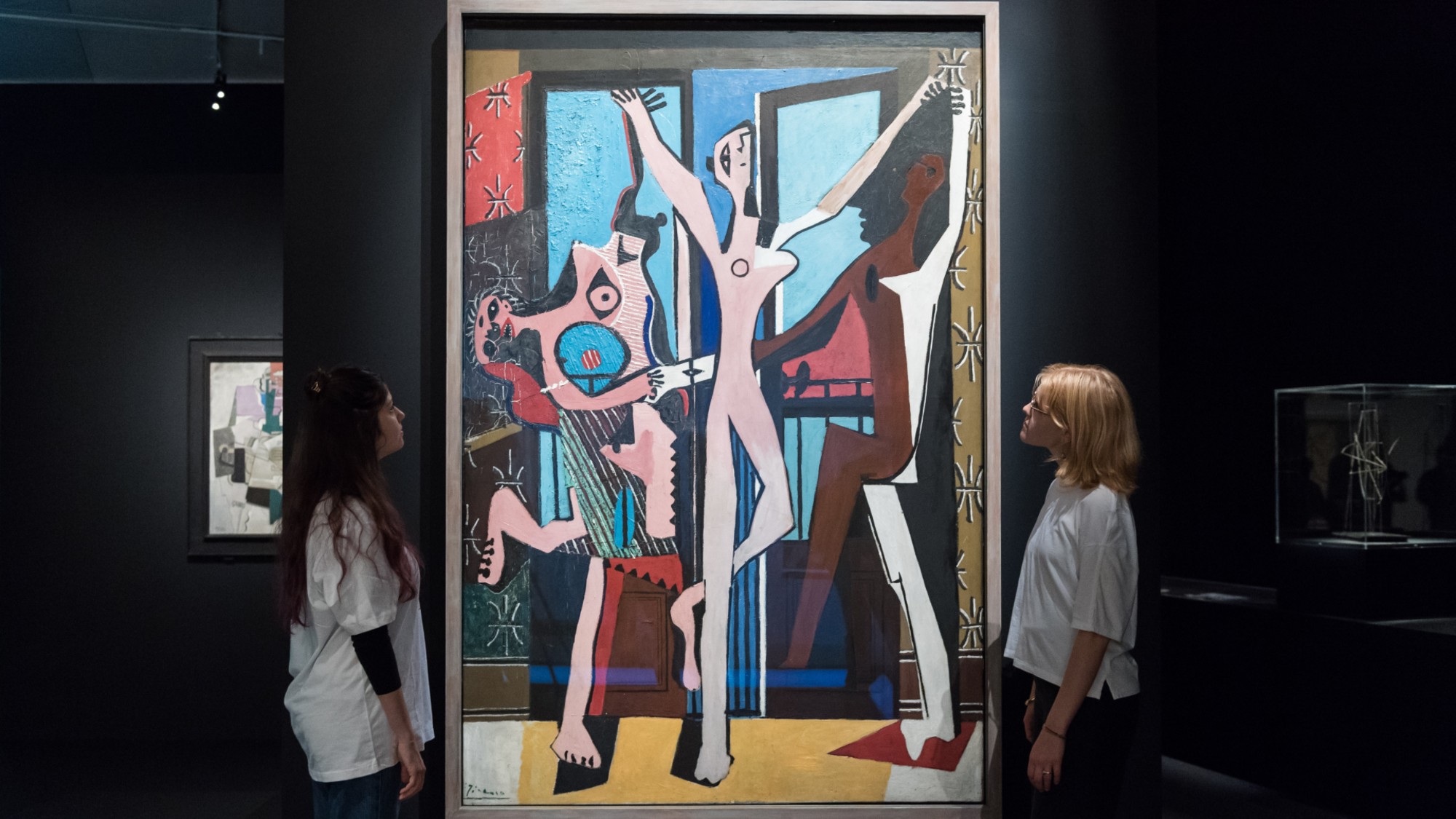Theatre Picasso at Tate Modern: familiar works reframed in an ‘adventurous’ way
The playful show examines the relationship between Picasso and theatre

A free daily email with the biggest news stories of the day – and the best features from TheWeek.com
You are now subscribed
Your newsletter sign-up was successful
“It’s been a long time – several years – since an event as stimulating as this opened at Tate Modern,” said Waldemar Januszczak in The Sunday Times. It pulls off a difficult trick: reframing the work of Pablo Picasso in a “fresh” and “adventurous” way. These days, the Spaniard is unfashionable because of his attitudes towards women; “he’s generally the coconut and angry damsels throw the balls”. The Tate, in “a nimble bit of curation”, has asked the trans performer Wu Tsang and the writer Enrique Fuenteblanca to mount a display dedicated to his love of theatre, which invites us to reconsider his work as a series of performances. Its focus is not on the disappointing theatrical sets that Picasso designed, but on his love of play-acting in general: his “taste for dressing up and his appreciation of other people’s roleplaying”; on his penchant for painting performers such as flamenco dancers and matadors. It brings together some 45 works by the artist; in short, the Tate has found an interesting way of “showing us every Picasso it owns”.
The show is certainly unconventional, said Laura Cumming in The Observer. Its design masquerades as the backstage of a theatre, complete with “spotlights, clattering music and surging voices”, “wings, ramps and footlights”; a screen shows a video of Picasso himself playing Carmen in a lace mantilla, while 16 “stupendous” images of “young lovers, pensive women and goatish old men” hang from mesh grids “like posters at Ikea”, and 1968’s “fierce and lustful” “Nude Woman With Necklace” bursts out of the theatrical darkness. It’s great to see so many works by the artist grouped together, but the show feels “muddled” and “sententious”. It completely swerves the question of Picasso’s cruelty to women, instead trying unconvincingly to make him “into our non-conforming contemporary”. It’s “contrived and contradictory”, and only confirms what we already knew: that Picasso “does not need to be updated for a new generation”.
The curators have made some terrible choices here, said Alastair Sooke in The Daily Telegraph. The show’s most important work, “The Three Dancers” (1925), is hidden away behind a wall; and what little analysis of the works there is “feels blinkered and wrong-headed”. It’s heavy on “opaque academic jargon”, much of it relating to contemporary identity politics. But if you ignore the “brain-aching” theorising in the explanatory texts, it’s really quite impressive, said Mark Hudson in The Independent. The “quasi-fictional setting” makes you look at the paintings afresh, and it gives an impressive sense of Picasso’s “protean chopping and changing”, the way he repeatedly reconfigured the human figure while quoting from everything from Rembrandt to African sculpture. I’ll admit that I expected “to hate this exhibition”, but it entrances the eye “spectacularly”.
The Week
Escape your echo chamber. Get the facts behind the news, plus analysis from multiple perspectives.

Sign up for The Week's Free Newsletters
From our morning news briefing to a weekly Good News Newsletter, get the best of The Week delivered directly to your inbox.
From our morning news briefing to a weekly Good News Newsletter, get the best of The Week delivered directly to your inbox.
Until 12 April at Tate Modern, London SE1
A free daily email with the biggest news stories of the day – and the best features from TheWeek.com
-
 Antonia Romeo and Whitehall’s women problem
Antonia Romeo and Whitehall’s women problemThe Explainer Before her appointment as cabinet secretary, commentators said hostile briefings and vetting concerns were evidence of ‘sexist, misogynistic culture’ in No. 10
-
 Local elections 2026: where are they and who is expected to win?
Local elections 2026: where are they and who is expected to win?The Explainer Labour is braced for heavy losses and U-turn on postponing some council elections hasn’t helped the party’s prospects
-
 6 of the world’s most accessible destinations
6 of the world’s most accessible destinationsThe Week Recommends Experience all of Berlin, Singapore and Sydney
-
 Bad Bunny’s Super Bowl: A win for unity
Bad Bunny’s Super Bowl: A win for unityFeature The global superstar's halftime show was a celebration for everyone to enjoy
-
 Book reviews: ‘Bonfire of the Murdochs’ and ‘The Typewriter and the Guillotine’
Book reviews: ‘Bonfire of the Murdochs’ and ‘The Typewriter and the Guillotine’Feature New insights into the Murdoch family’s turmoil and a renowned journalist’s time in pre-World War II Paris
-
 6 exquisite homes with vast acreage
6 exquisite homes with vast acreageFeature Featuring an off-the-grid contemporary home in New Mexico and lakefront farmhouse in Massachusetts
-
 Film reviews: ‘Wuthering Heights,’ ‘Good Luck, Have Fun, Don’t Die,’ and ‘Sirat’
Film reviews: ‘Wuthering Heights,’ ‘Good Luck, Have Fun, Don’t Die,’ and ‘Sirat’Feature An inconvenient love torments a would-be couple, a gonzo time traveler seeks to save humanity from AI, and a father’s desperate search goes deeply sideways
-
 A thrilling foodie city in northern Japan
A thrilling foodie city in northern JapanThe Week Recommends The food scene here is ‘unspoilt’ and ‘fun’
-
 Tourangelle-style pork with prunes recipe
Tourangelle-style pork with prunes recipeThe Week Recommends This traditional, rustic dish is a French classic
-
 Samurai: a ‘blockbuster’ display of Japan’s legendary warriors
Samurai: a ‘blockbuster’ display of Japan’s legendary warriorsThe Week Recommends British Museum show offers a ‘scintillating journey’ through ‘a world of gore, power and artistic beauty’
-
 BMW iX3: a ‘revolution’ for the German car brand
BMW iX3: a ‘revolution’ for the German car brandThe Week Recommends The electric SUV promises a ‘great balance between ride comfort and driving fun’